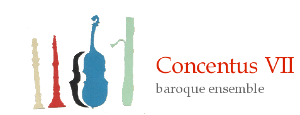The music of Francesco Barsanti is an inspiring combination of art music and folk music and the man himself had a fascinating life. Unfortunately there is not much known about Barsanti’s background. His father may have been the opera librettist…
William Croft – founder of the Academy of Ancient Music
William Croft (1678–1727) was the most successful English musician of his generation. His style forms a natural bridge between that of Purcell and the High Baroque. He composed works for the funeral of Queen Anne in 1714 and for the…
The oboe d’amore
The oboe d’amore is pitched a minor third below the oboe and has a bulb bell or Liebesfuß rather than the flared bell of the oboe. It is an instrument of the German high baroque. Christoph Graupner seems to have…
The Chalumeaux
Here at Concentus VII we branch out into the more obscure instruments of the Baroque from time to time. One of these is the chalumeau, basically a clarinet without its high register, which Louise plays for example when we do…
The Real Concentus VII
Johann Jacob Fux (1660–1741) stands at the apogee of the Austrian baroque, the musical embodiment of the Hapsburgs’ world; J.S. Bach placed him first among his contemporaries. At some pint during his early career he made a trip to Italy…
Handel’s Mi Palpita il cor
© Concentus VII
Telemann and the recorder
Pepusch: the human rights activists employed by a charming scoundrel
Johann Christoph Pepusch (1667–1752) was born in Berlin, the son of a Protestant minister. He left Germany in search of a more just society after witnessing the execution without trial of a Prussian officer accused of insubordination. He arrived in…
The Arcadian Academy: plagiarism, deceit and cover-ups
The Pontificia Accademia degli Arcadi (The Academy of Arcadia) was an Italian literary society established in Rome in 1690, although its origins can be traced back to February 1656, when a literary circle formed around the patronage of Queen Christina…
